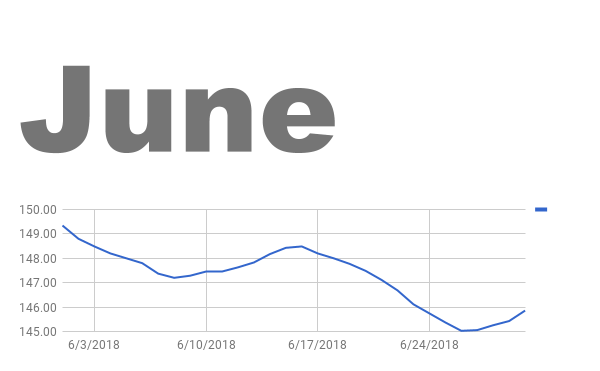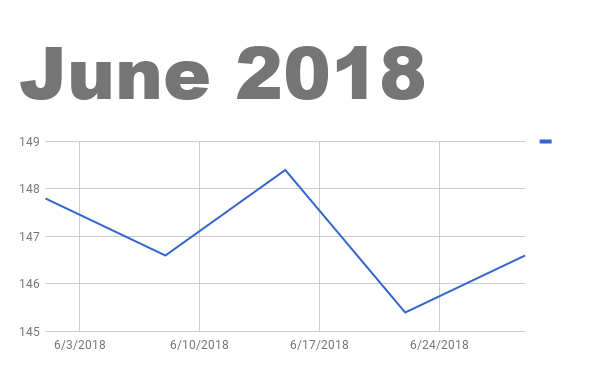[spoiler title=’Click for video transcript’ style=’default’ collapse_link=’true’] keeping track of my seven-day average has been key to staying on plan for the long term in 2015 I started weighing myself every day and I read an article at that time that said you know really it’s helpful if you weigh every single day and then you keep track of your seven-day average the article that I read said that people actually had better success sticking with the plan over the long term if they looked at that number instead of just their daily weight and this has really helped me to take a long view of where am I at like where am I at where did I come from and then how is my weight trending I know the argument is you know well I’ll just weigh once a week because I think there’s a fear there that you know if you’re weighing every day you’re like obsessing about your weight but I’ve found it’s actually much better because you’re getting more data if you’re weighing every day you have seven times as much data to work with so what the seven day average is is really really simple you just take your weight that you had every single day for the past seven days you add it up and you divide by seven now I use my weight tracking spreadsheet to calculate that for me automatically and the Fitbit app actually does a 7-day average but it’s not a running average it just takes each week it takes the past seven days for that week and does it so it’s not a running average so that’s why I don’t use that let me give you an example visual example of what the single day weights for June 2018 looked like for me now and if I only weighed let’s just say once a week those numbers look even worse for example like if every Friday was my weigh-in day you know I would have thought that at the beginning of that month I was at you know one forty seven point six and then you know the weight would have fluctuated up and down and up and down and at the end of the month it would have looked like I only lost like maybe a pound but if you look at how my seven day average was actually at the beginning of the month my weight that seven day average was much higher and then by the end of the month I had lost about four pounds almost so it really has helped me to learn how to look at the long view and it evens it out now it doesn’t get rid of all the fluctuations like sometimes it’ll kind of come up and then it’ll go back down but it’s overall a smoother slope down and what this does is it helps me to not celebrate too quickly you know when I have a really low day but it also helps me to not despair too quickly you know when I have you know Mexican food the night before and you know the weight goes up by a few pounds it’s really given me a lot of freedom to know like you know yeah there’s gonna be that up day but I’m not concerned about that one up day I’m more concerned with you know I really even like to look at about two months back I like to look starting about two months back and then just watch how the seven day average has gone down and my weight loss at this point now that I’m in the normal weight range it has really slowed down but it has really helped me to keep track of the 7-day average because it shows me even though the weight loss is slow it is still coming down you know a third of a pound a week you know if I was looking at the daily weights I probably would never really know actually I probably would have given up a long time ago and said you know I’m at where I’m at and I’m the weights just not moving anymore so it probably would have stopped and just said I’ll maintain but by watching that seven-day I know like no it’s still coming down it’s slow but it’s still coming down so I would highly recommend if you’re not keeping track of your seven-day average try it out and see I’ve had a lot of people that tell me they’ve had the same experience I have like once they started keeping track of a seven-day average they really could tell like oh you know the weight is moving maybe a little slower but it is moving down so that’s been my experience – the 7-day average I’m curious to know are you keeping track of the seven-day or maybe maybe you look at something different let me know in the comments below okay thank you for watching be sure to LIKE comment and subscribe down below [/spoiler]
Video Recap
I weigh every day, but I don’t pay much attention to my single day weight. I instead average my past 7 days of weight, and that has helped me to not worry about days when my weight fluctuates up. To keep track of your 7 day average, simply add up your weights for the past 7 days, and divide by 7. You can also download the spreadsheet I made which calculates it for you automatically here:
Download “7 Day Average Weight Tracker”
7-Day-Average-Weight-Template-From-Six-Miles-To-Supper-1-1.ods – Downloaded 48861 times – 68.57 KBVisual Comparison: Weekly Weighing vs Daily Weighing vs 7 Day Average
Weekly Weighing
Weekly weigh-ins don’t work for me. I tend to get too nervous if I’ve had too many “off days,” and then I just stop weighing altogether. And traditionally in the past, that’s when I start packing on the pounds. But aside from that, a weekly weigh in just doesn’t tell the whole story. Let’s look at June 2018:
If I only looked at my weight once a week, I would have thought I started the month at 147.4, lost a pound the next week, gained two pounds the next, and then lost those 2 pounds the next week, and then gained a pound the next. Talk about an emotional roller coaster!
Daily Weighing
Paying attention to my single day weights is a step in the right direction for me. It gets me on the scale every day. It makes weighing a habit. It takes the fear out of weighing. But, that can get confusing too. It is frustrating to think, “Hey! I gained 3 pounds yesterday!” And then even more confusing if the next day you lose 2. Here’s what my daily weights looked like for June 2018:
Weighing every day gives me 7 times as much data compared to once a week weigh-ins. And while it’s more information, it can still be a pretty bad roller coaster.
7 Day Averaging
Now, instead of only looking at the single day weights, let’s take those numbers and plug them into our 7 day average formula, and see what the numbers look like:

There are a couple of things to notice: first, see how much smoother the line is? It’s not a straight line down, but it is a whole lot smoother. It also helps me to feel the ride is smoother. I don’t celebrate low weight days too quickly, and I don’t despair over single high weight days either. Also, notice that my average weight starting the month was higher than what the single day weights in the beginning would have lead me to believe. I ended the month almost 4 pounds lighter on average.
If you’ve been frustrated in the past because you feel like the scale’s just not moving, I’d encourage you to start weighing daily and keeping track of your 7 day average.


